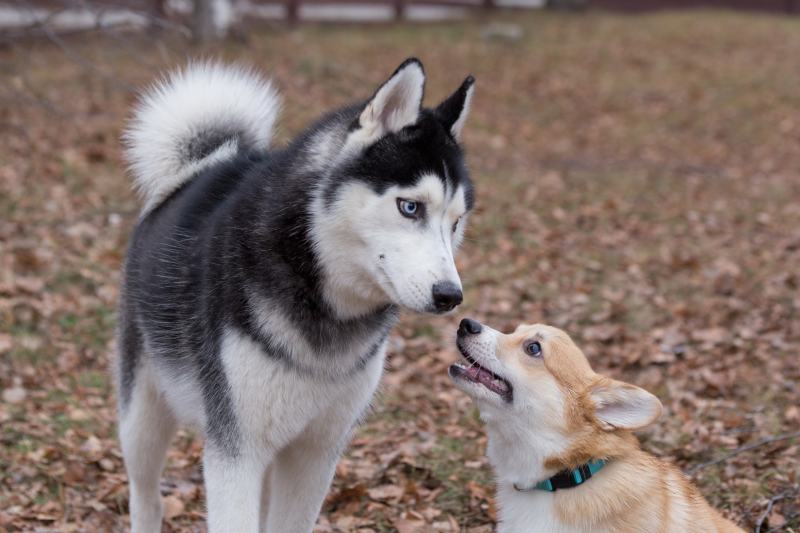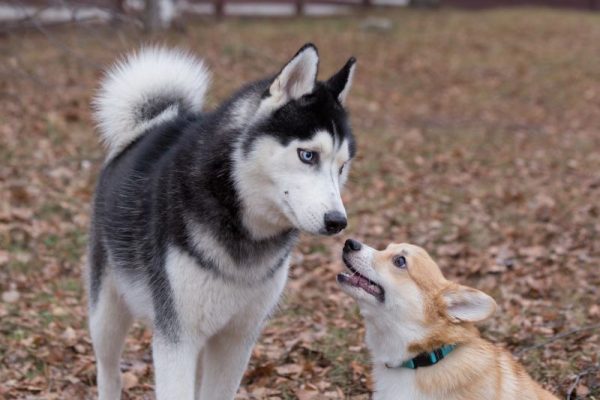Corgis generally have an agreeable temperament and are known to get along well with other dogs. However, early socialization is key to ensuring a smooth and successful relationship.
Introducing your Corgi to other dogs in controlled settings, such as puppy classes or dog-friendly parks, will help them learn proper canine manners and build confidence in their interactions with other canines. Furthermore, positive reinforcement training for basic commands such as “sit,” “stay,” and “come” can help teach your Corgi appropriate behaviors around other dogs.
Here’s an in-depth overview of how Corgis interact with other dogs.

Do Corgis Get Along With Big Dogs?
Corgis don’t discriminate when it comes to making friends. They typically get along with big dogs just as well as with small breeds. Corgis may be smaller, but their spunky and outgoing personality helps them get along with all kinds of furry friends.
It’s not uncommon to see a Corgi and a Great Dane happily playing together. With proper introduction, socialization, and training, Corgis can become comfortable around larger dogs.
The size of the dog is less of a concern than the temperament. Aggressive breeds like the Doberman may not be the best match for a Corgi. It’s essential to observe the behavior of both dogs before introducing them to one another.
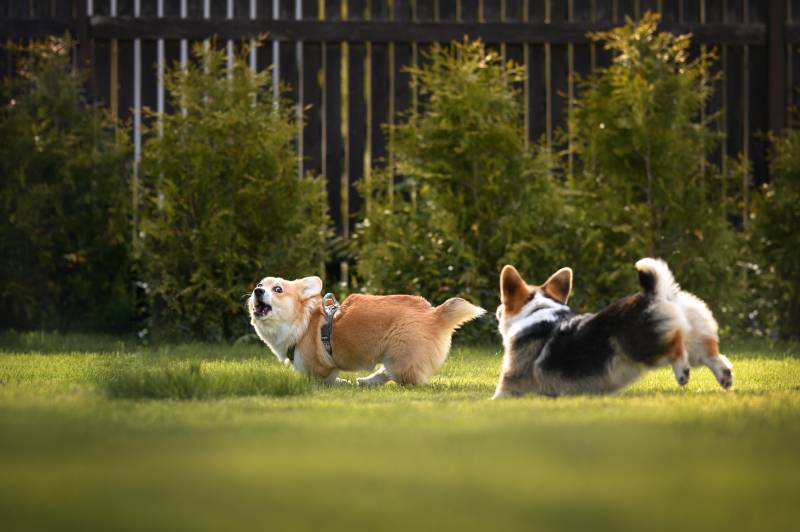
Which Dogs Do Corgis Get Along Best With?
Some breeds make better companions for each other than others. Generally, Corgis get along best with other dogs that are similarly sized, have a friendly and outgoing personality, and have been properly socialized.
Breeds that fit this description include Australian Shepherds, Labradors, Beagles, Golden Retrievers, and pugs. If you’re planning to get a second dog, opt for a breed that matches your Corgi’s personality and temperament.
For example, Labradors, although big, have inherently friendly personalities. They are also very playful and make great playmates for Corgis. Meanwhile, Beagles have a pack mentality because of their hunting heritage. So, they get along with other dogs in the house.
The key is to find a breed that not only gets along with your Corgi but also complements its personality. It will ensure that both dogs can have a good relationship with little to no conflicts.
Are Corgis Aggressive With Other Dogs?
There’s no evidence to show that Corgis are innately aggressive, but lack of socialization or negative experiences can lead to aggression in any breed, including Corgis.
If your Corgi snaps at other dogs, it may be due to one or more of the following reasons:
- Territory Protection: If your pet thinks another dog is encroaching on its territory (i.e., your yard or home), it may become aggressive to ward off the other dog. Corgis also become territorial over their humans and toys.
- Food Aggression: It’s common for dogs to become aggressive if they feel their food or treats are being threatened.
- Lack of Socialization: Corgis need to be socialized from an early age to be comfortable around other dogs and humans. If they don’t get early socialization, they may become aggressive toward people or other animals.
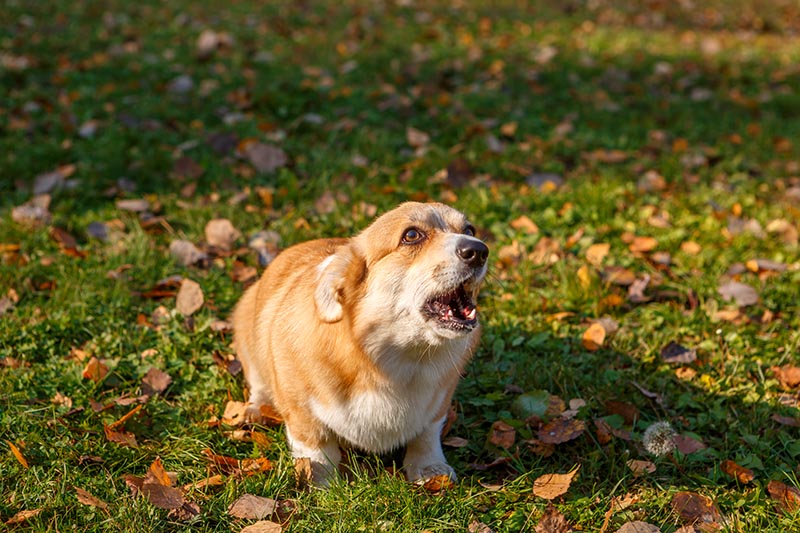

How to Socialize a Corgi
Socialization helps Corgi get along with other dogs. It also reduces the chances of your pet showing aggression toward other dogs or humans.
Socializing a Corgi involves familiarizing them with sounds, objects, people, sights, and smells they will most likely experience in a public setting. By exposing your Corgi to these stimuli regularly, you can help them become more comfortable and confident in social situations.
Here’s how to integrate these elements into your Corgi’s life:
Sounds
Think of the sounds a dog will hear when you take them for a walk: cars, people talking, children playing. Although you can buy downloads with these sounds specifically composed for dog training, it’s easier and cheaper to find these sounds online.
- Sirens
- Music
- Doorbell ringing
- Kids crying and playing
- Dogs barking
- Car horns
When starting, play the sounds at a lower volume and gradually increase it. Also, always do this in a familiar and safe environment first.
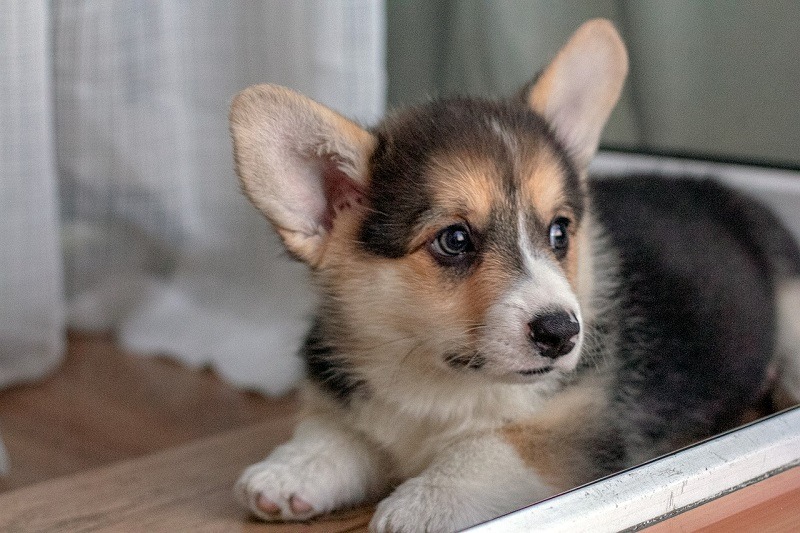
Objects
Find objects that your Corgi can interact with.
- Chairs
- Umbrellas
- Sticks
- Toys
- Wires
- Shoes
- Skateboards
- Lights
- Shopping carts
Allow your Corgi to approach and interact with these objects at their own pace. If they seem scared or uncomfortable, don’t force them to interact with it. Instead, give them time to adjust and become comfortable with the item.
People and Dogs
Now comes the fun part—introducing your Corgi to other people and dogs! When starting, look for calm, friendly people with whom your pet can interact. Let them approach each other and give your pet time to adjust. If they are uncomfortable, take a break and try again later.
Once your Corgi is comfortable with people, start introducing them to other dogs. You can do this by taking them for a walk in an area with other dogs or attending puppy classes.
Start with a single dog first and watch your pet’s reaction to ensure they’re comfortable. If your pet is getting too excited, take a break for them to calm down.

How to Use Positive Reinforcement to Socialize Your Corgi
Positive reinforcement means rewarding your pet for good behavior. When socializing your Corgi, you can use treats or toys to reward them for being calm around people and other dogs. It will help them associate good behavior with positive rewards, making them more likely to repeat the same actions in the future.
Suppose your Corgi is hesitant around new people. Here are some tips for positive reinforcement:
- Set up short play sessions with a person your pet already knows and likes.
- Start the session with food rewards and praise, gradually increasing your pet’s time with the person.
- Arrange doggy playdates with familiar, friendly dogs.
- When your Corgi displays good behavior, like being calm and relaxed, reward them with treats or toys.
What Is the Socialization Period for Corgis?
Teaching a young dog is much easier than training an adult dog, and Corgis are no exception. The best time to socialize a Corgi is at 8 to 16 weeks of age. During this period, Corgis are still forming social bonds and learning about their environment, making them more open to new things.
After the socialization period ends, Corgis may become more timid and cautious. The generalizations they have adopted at a young age become ingrained in their minds. It may be hard to undo these behaviors. So, it’s important to socialize a Corgi during its early months.
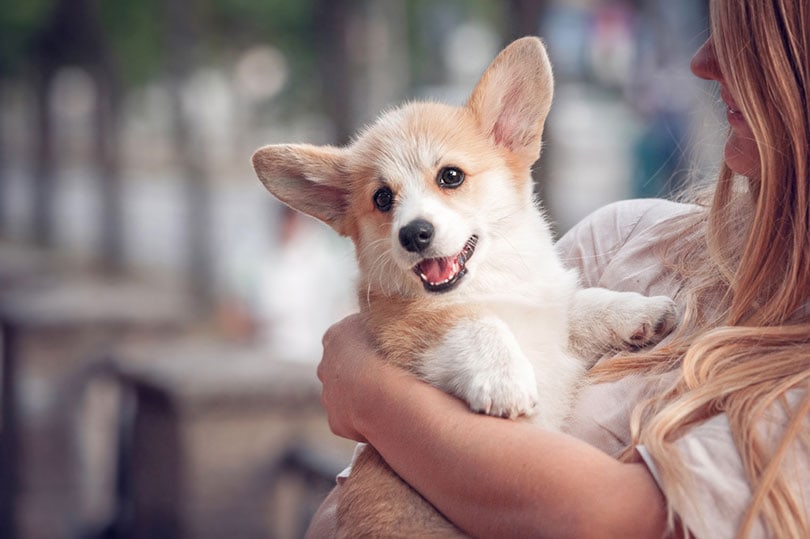
Safety Tips: How to Ensure Safe Interactions Between Corgis and Other Dogs
When introducing a Corgi to another dog, it is essential to create an atmosphere of calm and respect. Before introducing them, sniffing each other out through a fence or from a distance can help build trust and familiarity.
Corgis have a tendency to be fearful and defensive. Thus, you must make sure the other dog is also well-socialized and friendly.
- If possible, keep both dogs on a leash initially. You can then slowly let go of the leash and allow them to interact.
- Monitor their interactions closely, as you never know when one may become agitated. If any signs of aggression appear, separate them right away.
- Reward positive behaviors with treats and verbal praise.
- Do not leave them together unsupervised.
- Ensure both dogs get the same amount of attention so that neither feels neglected or left out.

Conclusion
Corgis get along with other dogs as long as they’re well-socialized and have friendly personalities. Introduce the dogs slowly and carefully, always monitoring their interactions.
The goal is to create an atmosphere of trust and respect between the dogs. Use positive reinforcement and rewards to shape their behavior. Plus, take it slow. With some patience and dedication, you can help your Corgis become friends with any dog.
Featured Image Credit: Tikhomirov Sergey, Shutterstock
Contents
- Do Corgis Get Along With Big Dogs?
- Which Dogs Do Corgis Get Along Best With?
- Are Corgis Aggressive With Other Dogs?
- How to Socialize a Corgi
- How to Use Positive Reinforcement to Socialize Your Corgi
- What Is the Socialization Period for Corgis?
- Safety Tips: How to Ensure Safe Interactions Between Corgis and Other Dogs
- Conclusion

